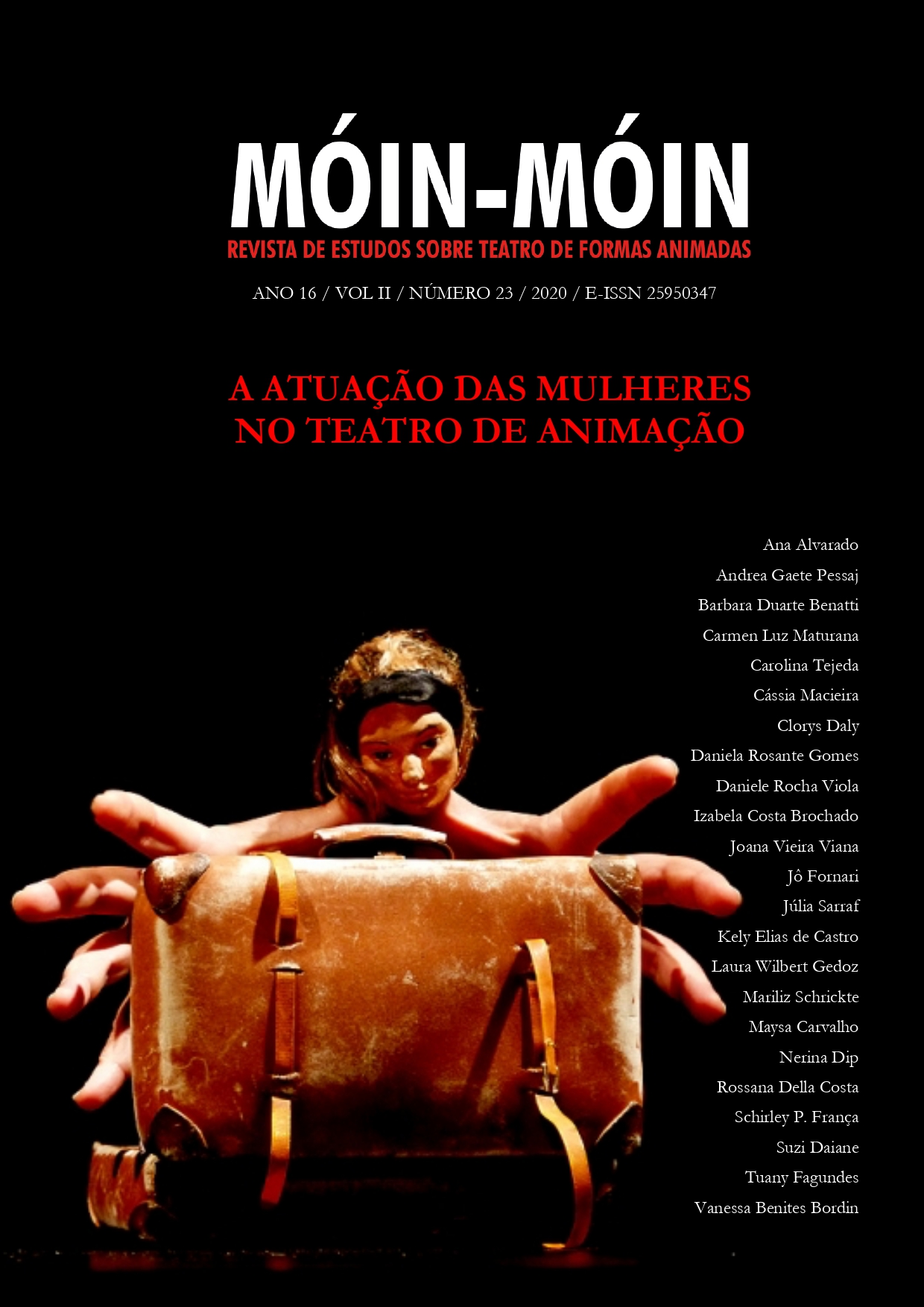The woman's body as a residence in Habite-me
DOI:
https://doi.org/10.5965/2595034702232020218Keywords:
Habitar, mulher, Teatro de animaçãoAbstract
This article is the result of dialogue and interaction with Carolina Garcia, actress and
producer of the theatre play Habite-me (2019). The show, defined as theater of masks, dance
and puppets, has a prologue and three parts, and deals with existential themes, such as life and
death, the relationship with the passage of time and care for others. The proposal, by enlivening
these themes and intertwining them with a woman's body, also engages in a dialogue with the
other elements of the scene, acquiring different contours and expanding them. Habite-me is the
result of an exchange between artists from Brazil, Canada (Cie.Territoire 80) and Belgium.
Downloads
References
AHLERT, Alvori. Corporeidade e educação: o corpo e os novos paradigmas da complexidade. Revista Ibero-Americana de Educação. V.1, nº56, p.1-13, 2011.
BACHELARD, Gaston. A poética do espaço. São Paulo: Martins Fontes, 1993.
BALARDIM, Paulo César. Desdobramentos do Ator, do Objeto e do Espaço. Florianópolis, 2013. Tese (Doutorado) - Centro de Artes, Universidade do Estado de Santa Catarina.
CORSO, Diana. O insuportável do corpo feminino. Vídeo. Canal Café filosófico da TV Cultura. Exibido em dezembro de 2016. Disponível em: https://www.youtube.com/watch?v=oHiLo8nTyT0&t=1079s . Acesso em 01/06/ 2020.
COSTA, Felisberto Sabino da. Máscara: corpo. Artifício. In: BELTRAME, Valmor Nini e ANDRADE, Milton de (Org.) Teatro de Máscaras. Florianópolis: UDESC, 2010. p.11-26.
DICHTCHEKENIAN, Nichan. O Mundo é a casa do homem. Palestra proferida em 29/09/2006. Disponível em: http://www.fenoegrupos.com/JPM-Article3/pdfs/Nichan_Mundo.pdf . Acesso em 15/07/2020.
DICHTCHEKENIAN, Nichan. A poética como revelação do habitar em Heidegger e a poética como constituição-mundo em Bachelard. Vídeo da palestra proferida em 29/09/2014. Publicado em 16 de janeiro de 2015. Disponível em: https://www.youtube.com/watch?v=xy7IZpCzFzU . Acesso em 22/06/2020.
ESTÉS, Clarissa Pinkola. A ciranda das mulheres sábias: ser jovem enquanto velha, velha enquanto jovem. Rio de Janeiro: Rocco. 2007.
GARCIA, Carolina. Entrevista concedida a Joana Vieira Viana via Whatsapp. 20 de junho a 30 de julho de 2020. Entrevista.
GIL, José. Movimento Total. São Paulo: Iluminuras, 2002.
NETO, João Cabral de Melo. Habitar o Tempo. Poema. Disponível em: https://solangef.wordpress.com/2008/12/29/joao-cabral-de-melo-neto-habitar-otempo/. Acesso em 24/06/2020.
NIETZSCHE, Friedrich. Assim falava Zaratustra. Ebook, 2002. Disponível em: http://www.ebooksbrasil.org/adobeebook/zara.pdf . Acesso em 20/07/2020.
NOGUÈS, Joëlle. Transfiguração dos corpos. Os corpos pensantes. Móin-Móin: Revista de Estudos sobre Teatro de Formas Animadas. Jaraguá do Sul: SCAR/UDESC, ano 13, v.17, 2017. p.15-29.
RAGO, Margareth. Epistemologia Feminista, Gênero e História. In: PEDRO, Joana Maria; GROSSI, Miriam Pilar (Orgs.). Masculino, feminino, plural: Gênero na interdisciplinaridade. Florianópolis: Ed. Mulheres, 1998.
RILKE, Rainer Maria. Elegias de Duíno. Tradução: Dora Ferreira da Silva. 6 Ed. São Paulo: Biblioteca Azul, 2013. E-book, disponível em https://books.google.com.br/books?hl=pt-PT&lr=&id=mVkbAgAAQBAJ&oi=fnd&pg=PT3&dq=Rainer+Maria+Rilke+Elegia+de+du%C3%ADno+estranho+n%C3%A3o+habitar+mais+terra&ots=1AL4mKnsxe&sig=IqluOm0rOA55dA8LHwDMjwrPQ#v=onepage&q=Rainer%20Maria%20Rilke%20Elegia%20de%20du%C3%ADno%20estranho%20n%C3%A3o%20habitar%20mais%20terra&f=false . Acesso em 20/07/2020.
SUASSUNA, Ariano. O Auto da Compadecida. 19 ed. Rio de Janeiro: Agir, 1983.
VASCONCELOS, Romíria Penha Turcheti. A corporeidade do artista da cena por uma perspectiva das “peles”. In: I Semana Acadêmica do Curso de Teatro. UFSJ: 2015. Anais da I Semana Acadêmica do Curso de Teatro. São João del-Rei, MG, p.31-41.
Downloads
Published
How to Cite
Issue
Section
License
Copyright (c) 2020 Móin-Móin - Revista de Estudos sobre Teatro de Formas Animadas

This work is licensed under a Creative Commons Attribution 4.0 International License.
The readers are free to transfer, print and use the articles published in the Magazine, as long as there’s explicit mention to the author(s) and to Móin-Móin Magazine - Studies in Theater of Animated Forms and there are no changes on the original work. Any other use of the texts needs to be approved by the author(s) and the Magazine. In submitting an article to Móin-Móin Magazine - Studies in Theater of Animated Forms and have it approved, the author(s) agree to give away, without payments, the following rights to the Magazine: first publishing rights and the license for the Magazine to redistribute this article and its metadata to index and reference services that the editors consider appropriate.
The articles whose author(s) are identified represent the author’s point of view and not the official position of Móin-Móin Magazine. The author(s) commit to always mention the publication in the following way when publishing work in reference to the article published in Móin-Móin Magazine:
“This article was originally published by Móin-Móin Magazine volume (insert the volume), number (insert the number), in the year of (insert year) and can be accessed on: http://www.revistas.udesc.br/index.php/móin"
Plagiarism in any way constitutes an unethical publishing behavior and is unacceptable. Móin-Móin Magazine holds the right to use software or other plagiarism tracking methods to scan the submitted works.
![]()
This journal uses Attribution-NonCommercial 4.0 International– (CC BY NC 4.0).






